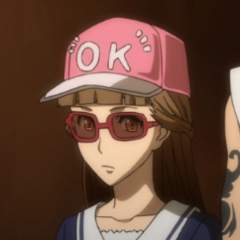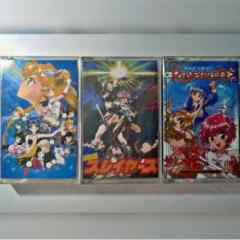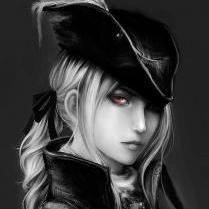Leaderboard
Popular Content
Showing content with the highest reputation on 02/28/21 in all areas
-

What is a game's quality? Is it objective?
Gibberish and one other reacted to Plk_Lesiak for a topic
Well, I don't want to go too deep into this either, but you wrote mostly about hating tropes it uses which is a lot more in the personal taste/cultural sensitivities category. Just like the complaints @Dreamysyu mentioned, that's kind of a whole another layer of discussion. Plus with production quality... Sure, people may dislike the artstyle or it might age poorly... The same might even happen to storytelling, with VNs as a medium and culture people live in changing. But you can both acknowledge something representing high quality in its original context and it not standing the test of time – but honestly, 2D games suffer from this way less than many other forms of media. Well, I'll have to retreat to the intersubjectivity term that Palas was so nice to introduce to the discussion. Obviously no standards can be truly objective because objectivity arguably doesn't exist at all. But that doesn't mean things like consistent writing or technical prowess are completely up to one's feelings – it's grounded in the societally-created rules on what is considered positive, or sometimes the internal logic of the text itself. I, once more, argue that quality assessment and overall judgment on whether a piece of media is good/enjoyable are interconnected, but separate. Pointing out plotholes and poorly directed shots that make everything into blurry mess – these are as close to factual statements as you can ever get in media criticism. You can use the word "valid", "grounded" or whatever to avoid the misleading framing, but it's still the same principle. Like, the only possible riposte you would have for the asshats you mentioned above would be "these things don't matter as much as you make them seem", which is a fair opinion, but in no way invalidates their complaints. People freak out about the "culture of nitpicking" nowadays but if you don't have a counterargument against the nitpick, it means it pointed out a flaw. And small flaws can combine into a deeply flawed experience – which might still be very much worthwhile or effective, but that doesn't mean those are not worth discussing or can't ruin the experience for some. That final assessment, of course, is a lot more subjective and requires a lot more elaboration than sheer quality assessment can ever provide. That's why a review which tries to be as objective as possible will not only fail to achieve that goal, but will likely also be a very crappy thing to read. Or is, indeed, a pose assumed in bad faith/to mask one's opinions.2 points -

What is a game's quality? Is it objective?
adamstan and one other reacted to Plk_Lesiak for a topic
I don't think saying Grisaia is the Twilight of VNs is that wrong... Maybe slightly exaggerated. But let's focus on Kajitsu for the time being. I think there are many positive things about it you'll be able to get most people to agree about. Like it's humour being well-done, the art and music being consistently high-quality and the common route effectively building up towards the dramatic character routes. The trashy and over-the-top parts of it, mostly showing up in the later parts of the experience, are what's most contentious about it – and it'd be easy to argue they wouldn't work, even for their intended audience, if they weren't preceded by the genuinely well-done aspects of the game, building the necessary emotional investment and slowly exploring the crucial characters. Also, from what I've seen, you'll find more people claiming it's a very enjoyable VN or a good entry-level one (for people who are not yet sick of the tropes it relies on), rather than seriously saying it's a masterpiece. In my ideal world, the statements "Kajitsu's heroine routes are trashy and over-the-top" and "Kajitsu is a great/touching experience for those that enjoy its stylistic" are completely compatible with each other and non-controversial. And we should, indeed, put all popular media to similar scrutiny. Edit: TBH, this is kind of a heavy(?) topic for me personally, as someone who plays with reviewing stuff. We're living in a world where things that I find objectively atrocious, like the Transformers movies, are wildly successful. And in a world where media critics fetishise technical competency and subversion of tropes that something as awful as The Last Jedi could become a critical darling. But still I don't think that we should give up on certain baseline quality standards. I mean, you can make various excuses and adjustments when it goes to specific genres and storytelling formulas, but for example, are teens too dumb to enjoy better prose and better-constructed characters than what Twilight offers? Nah. Its even on different level than Kajitsu, that very deliberately builds it's cascade of ridiculousness and ends up with something pretty unique despite remixing overused tropes – it's just lame writing, and that's the part that no amount of context can nullify.2 points -
Congratulations, you played yourself But, jokes aside, I'm also looking forward to the sequel Luckily, for this VN I managed to go spoiler-free. BTW I think that weird character limit for protagonist's name is there because developers couldn't be bothered to properly adapt the system from the Japanese version for English release - in Japanese number of characters would be enough for almost any possible name, when writing in kanji. BTW I have to ask - if I enjoyed this VN, would I be okay with Higurashi? (I'm almost 100% sure that Subahibi is a no-go for me, but Higurashi doesn't seem so fucked-up based on reviews) Yes it is, no doubts about it2 points
-

What is a game's quality? Is it objective?
Plk_Lesiak reacted to alpacaman for a topic
I don't really want to get too deep into discussing Grisaia as I don't want to derail the thread, but is it really the character routes that are the most contentious? I managed to really not like it in the common route, and some of the aspects you mentioned as objective positives played a big role in that. The comedic scenes all basically culminate in a "women are irrational, amirite" or "Yuuji is so badass" punchline and most of them are accompanied by the same music track so at some point every time it started playing I automatically zoned out, which imo isn't what proper sound direction should do. I strongly disagree about the character build-up as well. Other VNs don't need close to 50 hours to build up characters to make you care enough for them to feel sad for them when you learn they were once forced to cannibalise members of their softball team or whatever. As for the art, I agree it's competently done, but artwork especially something where time and general trends play a big role in how it is received. Most VN artwork from the 90s looks somewhat ugly by today's standards (except to fans of this particular style), and it's completely possible we are going to look at Grisaia in the same way in some 20-30 years. High/expensive production values are not the same as high quality. (Sorry, I couldn't contain myself). To add something more substantial, I completely get where you are coming from on this. I think the term you're looking for is "valid". You can point to a set of criteria a piece of media should adhere to in your opinion, explain where these criteria come from and why you accept them as an indicator for quality. You can say that the action scenes in the Transformers movies are bad because they are cut in a way that doesn't properly convey what is even going on instead of just cutting really fast between locations, and in your opinion an action scene should actually show the action. That is more valid than someone saying "skyscraper go boom", but it's not more objective. The reason I fight the term "objective" that much is probably because of these youtube channels that claim to do "objective criticism" when all they basically do is stop at every frame and scream "that's stupid", and by claiming to be objective they can pretend they are not just whining because they don't like a movie having a female/PoC protagonist who actually does stuff.1 point -

What is a game's quality? Is it objective?
Plk_Lesiak reacted to Dreamysyu for a topic
Well, I'm not talking for myself since I personally really enjoyed Kajitsu and its common route, but there is a common complaint with the comedy that it's basically making fun of people with serious mental problems or having these mental problems. Other that that, I agree with you.1 point -
As to your second point, I think quality being 100% reliant on context or whether something does its job are different categories. The former is more is more about the assessment of quality depending on which subset of the potential audience you ask while the latter is more about resonating with the intended target audience. To pick Grisaia as an example: Many in the VN fandom regard it as one of the must-reads, yet there is a subset of readers who hate it passionately (including me). I'd say that has to do with it committing to a certain set of VN tropes and turning them up to 11. For the people who love VNs because of these tropes this makes Grisaia on of the best things out there. For people like me who got into VNs for other reasons and are only bearing with some VNisms because other aspects make up for them, Grisaia can be unbearably bad. I can totally acknowledge that if a certain type of experience appeals to you, chances are you are going to love Grisaia. Stuff that might be considered an indicator of quality for Grisaia's target audience might be the opposite for others. So is Grisaia a masterpiece? No! It completely depends on who you ask. I don't even want to know what my mother or the average newspaper critic would think of it. Which is no different to something like Twilight. If you ask your 14 year old niece, it might be the greatest thing in the history of things. If you ask anyone else, not so much? So am I calling Grisaia the Twilight of the VN community? Yes. But my point is, you could basically do a similar mental exercise with any popular and/or highly regarded piece of media.1 point
-
Originally I didn't have much to say about this, other than that tastes are somewhat subjective and after strong evaluation I standby most of my writing decisions (even if some disapprove). But, I do appreciate all the effort you spent into pointing out all the parts you had problems with. So if nothing else, thank you for the constructive feedback and giving it a try. EDIT: I should add, when I say I standby the writing I don't mean to imply that I think the writing is free from fault. But personally, I'm done modifying this work and ready to move on with my life to other things. Most of the remaining flaws regarding the writing are either very pedantic technical details, or simply subjective disagreements.1 point
-
Yeah, that's what I figured as well. It'd be pretty weird to implement such a limit otherwise, when most of the other characters have names that are longer than that. Hard to say since I don't know quite how sensitive you are or what type of content affects you most. I found Higurashi a lot less disturbing than SubaHibi, but it's definitely a few shades darker and more impactful than World End Syndrome. In any case, I highly recommend you give it a try, because it's quite a ride if you're up for it! Just remember to grab the 07th-Mod.1 point
-

Digital Seclusion: A visual novel about visual novels [FREE]
Plk_Lesiak reacted to Zalor for a topic
I really appreciate the review and the fuwa-endorsement! Thank you for spending time to write up your thoughts!1 point -

Digital Seclusion: A visual novel about visual novels [FREE]
Zalor reacted to Plk_Lesiak for a topic
Well, Digital Seclusion is now officially Fuwa-endorsed: https://fuwanovel.net/reviews/2021/02/27/digital-seclusion/ Those that didn't read it yet, shame on you, but consider checking out both the review and the VN itself. Also, further discussion is encouraged. :31 point -
Finished World End Syndrome a few moments ago. I'm a big mystery fan, but I ruined the experience for myself here to some extent by unintentionally spoiling myself. Anyway, despite this and the cliffhanger-ish ending, I found the VN quite enjoyable as a whole, and I'm looking forward to see what they do with the sequel.1 point
-
“War was always here. Before man was, war waited for him. The ultimate trade awaiting its ultimate practitioner.” ~Judge Holden (Blood Meridian) “My love is destruction. Its flames ache to devour all that exist: Heaven and Hell, God and Satan; all things in Creation, from the first universe that was, to the last that will ever be.” ~Reinhard Heydrich (Dies Irae) The archetype of a sentient embodiment of war continues to persist, and has morphed considerably from its mythological origins. Having finished Cormac McCarthy's Blood Meridian, considered by some literary critics to be the great American novel. I am left transfixed by a particular figure, a haunting presence that defies death: the Judge, Judge Holden. The Judge is a complex figure, and there are many interpretations as to who he really is. One common interpretation is that he is the embodiment of war itself. This, along with his function in the novel, reminded me quite of bit of Reinhard Heydrich from Dies Irae. Reinhard proudly claims to be war itself, and so in this respect he is not subtle. What makes Reinhard standout as a villain, is how evil yet seductively charming he is. He wants destruction for its own sake, or really; for his amusement. To him war is fun, and an eternity spent warring couldn't be a more ideal form of the afterlife in his conception. He would be in complete agreement with the judge on this point: “Men are born for games. Nothing else. Every child knows that play is nobler than work. He knows too that the worth or merit of a game is not inherent in the game itself but rather in the value of that which is put at hazard. Games of chance require a wager to have meaning at all. Games of sport involve the skill and strength of the opponents and the humiliation of defeat and the pride of victory are in themselves sufficient stake because they inhere the worth of the principals and define them. But trial of chance or trial of worth all games aspire to the condition of war for here which is wagered swallows up game, player, all.” Easily some of the best parts of both Blood Meridian and Dies Irae are the speeches and dialogues given by Judge Holden and Reinhard respectively. At some point Reinhard in the midst of battle famously states, “I love everything, therefore I will destroy everything”. The judge says something essentially to that effect as well. Possessing a near expert level of knowledge on nearly every subject (something true of Reinhard as well), he is once asked by a fellow crew member why he always meticulously jots notes of artifacts they pass by. The Judge responds, “to expunge them from the memory of man”. What he's saying there is that he wants to record everything so that he can keep track of what he destroys, with his ultimate goal of destroying everything from the “memory of man”. This ties into another famous quote of his, “Whatever in creation exists without my knowledge exists without my consent.” In order to have dominion over everything (to become a “suzerain” in his own words), you must first know everything. For you cannot conquer what you don't know. There is however a key point of contrast between these two characters who share this same archetype. Judge Holden is visibly terrifying, with the image I included in this post being my favorite depiction of him. Reinhard on the other hand, is gorgeous. Compared to the Judge's bald head and completely hairless body, Reinhard is characterized with a mane of flowing blonde hair. The importance of this contrast in outward appearances is that the two characters signify different aspects of war. Reinhard best represents the seduction of war, and the glory as well as rewards it promises. In the prologue alone, he convinces countless Nazi soldiers faced with imminent defeat and slaughter against the Russian troops storming Berlin, to instead give up their own lives and souls to him. Encouraging them to participate in a group suicide that would put the largest of death-cults to shame. They went along with his command, because he promised the glory that Hitler failed to deliver on. It is also noted when that happened, “This could not have been the first time.” If Reinhard is the seducer of war, then the judge is its rapist. Indeed, there are several instances in the novel where it is heavily suggested that the judge was responsible for a brutal rape, but it is never concretely confirmed. But his fetish for violence is no secret. While the judge is capable of persuasive charm, his preference for violence is clear. Even when he does display his persuasive abilities, the threat of violence that his domineering stature imposes must surely add a feeling of extortion to any request he makes. To list the unfathomably gruesome cruelty of the judge would still not accurately communicate how truly horrifying he is. I think the best example is when he was left in charge of the gang and a group of hostages when the gang leader, Glanton, had to leave for other business. When Glanton finally returns, one of the hostages comes desperately running to him only able to say, “That man, that man.” What Judge Holden personifies, is the horror of war itself. I suppose the last point of comparison I would like to touch on, is how both Reinhard and judge Holden are based on real people. Reinhard Heydrich was a high ranking Nazi official. They tie this in an interesting way in Dies Irae, but obviously the overall depiction of Reinhard in Dies Irae is mostly fictional. Judge Holden on the other hand is much more mysterious. Both the real and fictional Judge Holden was the second in command of the Glanton Gang; mercenaries who in 1849 temporarily worked for the Mexican government to genocide Apache Indians. However, the Glanton gang (lead by John Glanton) also slaughtered peaceful tribes in order to collect more Indian scalps which they could exchange for a higher bounty. At the end of 1849 the state of Chihuahua outlawed the gang, and put bounties on their heads. Samuel Chamberlain, who at one time worked for the Glanton gang wrote about his experiences with them in his memoir: My Confession: The Recollections of a Rogue. Mentioned several times in the memoir, it's the only document that attests to the existence of Judge Holden. In it he is described as, “a man of gigantic size called "Judge" Holden of Texas. Who or what he was no one knew but a cooler blooded villain never went unhung; he stood six feet six in his moccasins, had a large fleshy frame, a dull tallow colored face destitute of hair and all expression. His desires was blood and women.” In the memoir he also notes, “Holden was by far the best educated man in northern Mexico; he conversed with all in their own language, spoke in several Indian lingos, at a fandango would take the Harp or Guitar from the hands of the musicians and charm all with his wonderful performance.” It is the fact that the only testimony of the Judge's existence is in several pages of an obscure, forgotten memoir that makes him more terrifying for me. Given how similar the description of the real Judge Holden, and the fictional one is, it makes it that much more difficult to draw the line between fiction and reality. What can be said though is that “war endures”. As long as there are masses of people desperate for glory, then Reinhard will be there to seduce them. And as long as there are blood soaked battlefields, the towing silhouette of the judge will be there to lead men to their doom.1 point



